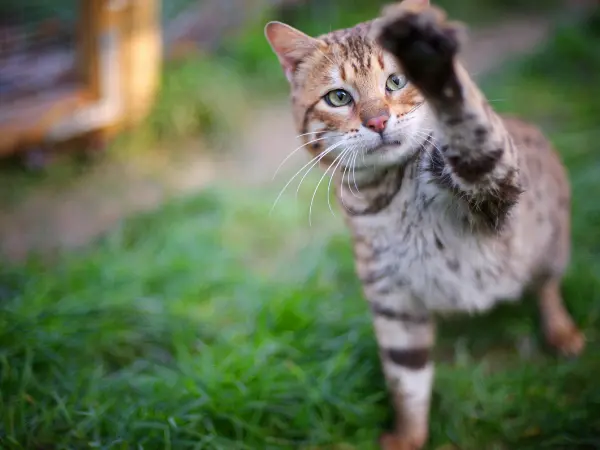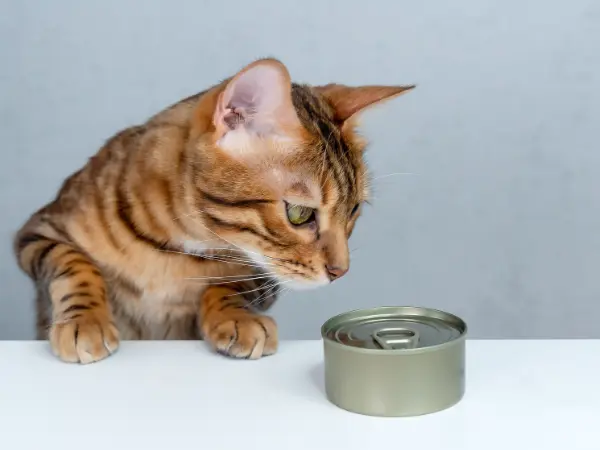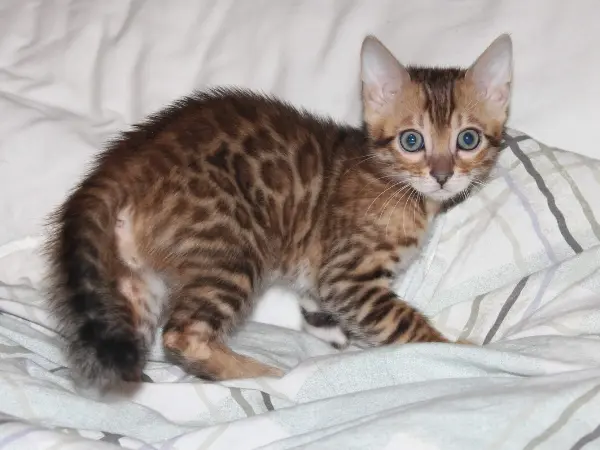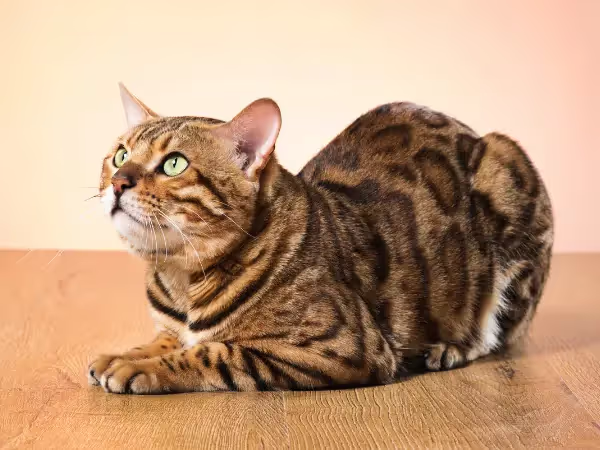Cat parents adore Bengal cats for various reasons. Whether it’s for their luxurious leopard-like rosette markings, high levels of playful energy, semi-hypoallergenic fur, or their unusual love of water, there are many reasons to love Bengal cats. However, this cat breed is not for everyone, as Bengal cats tend to need a lot of physical activity and can be more vocal compared to other breeds.
If you have a special Bengal cat companion in your home, this guide is for you. In this Sploot Vets breed guide, we talk about overall Bengal cat care and Bengal cat health issues to be aware of.

Are Bengal Cats Difficult to Take Care Of (High Maintenance)?
While Bengal cats are low-maintenance in terms of grooming, they are considered high-maintenance in terms of their energy level, need for stimulation, and social needs.
Here are a few tips for first-time or to-be Bengal cat parents:
- Cat-Proofing Is Important – Bengal cats, and especially Bengal kittens, are curious and persistent. If there are any exposed wires, fragile items, poisonous plants for cats, and unsafe substances for cats, they might get into accidents, which is why careful cat-proofing is essential.
- Close the Bathroom Door – Bengal cats have an unusual love of water, whether it’s pawing at the water from a faucet or wading in the toilet bowl. For hygienic reasons, close the bathroom door when not in use.
- Safety First for Outdoor/Swimming Activities – Bengal cats, especially younger cats or kittens, tend to be on the adventurous side. If you will travel with them or take them outside, ensure that they are in a secure crate and/or have a cat-friendly harness on.
- Consider Spaying or Neutering – Bengal cats tend to be very vocal and territorial, more than some other cat breeds. Spaying and neutering can help reduce excessive meowing and territorial behaviors, but may not get rid of these behaviors completely.
- Consider Getting Them a Friend (With Matching Energy) – When alone, many Bengal cats will seek attention and need plenty of stimulation from their cat parents. This is why some cat parents consider getting them a friend. When getting a companion for your Bengal cat (or considering a Bengal as a companion for your current pet), ensure that the other pet is tolerant, energetic, and around the same size as the Bengal cat. Bengal cats are NOT inherently aggressive towards other pets, but may accidentally hurt pets that are older, more timid, and significantly smaller.

Common Bengal Cat Health Issues
Similar to many other cat breeds, a majority of Bengal cat health issues are caused by genetic predispositions. All in all, however, they are fairly healthy cats, especially with consistent care. Here are the most common Bengal cat health issues to look out for.
- Hypertrophic Cardiomyopathy (HCM) – This is an inherited Bengal cat health issue that causes a thickening of the heart muscle. An early diagnosis and treatment can improve your Bengal cat’s quality of life.
- Progressive Retinal Atrophy (PRA) – This is another inherited health issue in some Bengal cats, leading to vision loss. While there is no cure after a cat is diagnosed, nutritional support can help slow this condition down, and environmental tweaks can help the cat adapt.
- Luxating Patella – This Bengal cat health issue can be either inherited or caused by trauma, leading to a slipping or dislocating kneecap that may affect mobility. Early detection is important for the effective management of this condition.
- Gastrointestinal Upset / Foreign Body Ingestion – A Bengal cat’s curious nature might sometimes lead to the ingestion of harmful substances or foreign objects, which highlights the importance of cat-proofing for Bengal cats.
- Accidents, Falls, & Sprains – Bengal cats, especially kittens, tend to be very active and athletic, climbing onto more countertops, shelves, cabinets, and other high places. Unfortunately, this can sometimes lead to accidents, falls, and sprains, requiring urgent veterinary care.
- Feline Infectious Peritonitis (FIP) – Bengal cats are among the breeds that have a high prevalence of Feline Infectious Peritonitis (FIP), due to genetic factors that affect their immune response. This viral disease is caused by feline coronavirus and it targets the respiratory system. It can lead to life-threatening symptoms in susceptible cats, including some Bengal cats.
- Feline Inflammatory Cystitis (FIC) – This is a painful bladder condition that causes frequent urination, straining, and peeing outside the litterbox, often triggered by stress. Bengal cats can be more prone to FIC, possibly due to their heightened environmental enrichment needs, as well as susceptibility to stress.

Complete Bengal Cat Care Tips
1. Health & Veterinary Care for Bengal Cats
As with all cat breeds, Bengal cats need the following to stay at their healthiest and happiest: yearly or bi-yearly pet wellness exams, cat vaccines, heartworm preventives, dietary optimizations, and enrichment.
Note: Pet wellness exams help facilitate personalized care and the early detection and treatment/management of health issues that Bengal cats are predisposed to.
2. Dental Care for Bengal Cats
All cat breeds can benefit from regular dental care, and Bengal cats are no different. Regular dental care helps prevent the buildup of plaque and tartar, thus helping to reduce the risk of various dental issues in cats.
Dental care for your Bengal cat includes the following:
- Scheduling annual dental exams and anesthetized complete oral health evaluation, dental radiographs, and cleaning with a vet
- Brushing your Bengal Cat’s teeth a few times a week.
- Providing vet-recommended dental treats or water additives for cats (especially if your cat is highly resistant to brushing).
3. Bengal Cat Nutrition & Diet
We always recommend choosing AAFCO cat food recommended by your veterinarian. Cat food that is complete and balanced according to AAFCO standards will provide your Bengal cat with the daily nutrients and energy that they need.
A few additional features to look for in your Bengal cat’s food include:
- High-quality protein & a high protein percentage – supports your Bengal Cat’s muscular build and the repair of muscles and soft tissues when needed. Protein also helps promote overall health.
- Glucosamine & chondroitin – these 2 compounds work together to support cartilage health, helping protect against joint wear and tear as your Bengal cat ages.
- Omega-3 – a fatty acid that helps reduce inflammation and is essential for maintaining a healthy heart and joints in Bengal cats.
- Taurine – an essential amino acid for cats, taurine supports heart function and a healthy vision. Taurine can help slow down progressive retinal atrophy (PRA) in Bengal cats that have them.
- Antioxidants – these help promote cellular health and may also help in slowing down PRA in Bengal cats.
Note: Indoor cat food, while beneficial for many breeds, may NOT be suitable for highly active Bengals. Indoor cat food is formulated to have lower calories, best for preventing weight gain in moderate-activity or sedentary cats. For active Bengal cats, especially young adult Bengals, indoor cat food can lead to malnutrition.

4. Bengal Cat Exercise & Mental Stimulation
Physical activity and mental stimulation are some of the most important aspects of Bengal cat care. As we’ve mentioned in the above sections, Bengal cats are known to be very active and may have a higher need for mental stimulation. To keep your Bengal cat happy and active, here are some tips to explore:
- Get sturdy climbing structures for your Bengal cat – Bengal cats love to climb; therefore, climbing structures will help provide them with both physical activity and mental stimulation. Whether you opt for cat towers, cat condos, cat shelves, or catwalks, ensure that they are sturdy, because Bengal cats weigh more than other domestic cats and may use cat furniture more energetically.
- Play fetch with your Bengal cat – Whether trained or instinctively learned, some Bengal cats enjoy playing fetch. Though they are not the only cat breed that enjoys this game (some Ragdolls and Maine Coons enjoy it too), Bengals that learn and enjoy this game tend to play with added enthusiasm, pouncing after small bouncy balls or cat toys tossed across the living room.
- Get your Bengal cat a treadmill – Often present in cat cafes, cat treadmills are a great way to provide your Bengal cat with exercise. More sedentary cat breeds may ignore the treadmill, but Bengals are more likely to enjoy walking or sprinting on a cat treadmill, showcasing their athletic prowess.
- Swimming or playing in the bathtub – Their unusual love of water is one of the Bengal cat’s most lovable traits. One of the safest ways to let them enjoy the water is by giving them bathtub play time (this can also double as their bath time).
- Get your Bengal cat a friend – Getting your Bengal cat a companion helps them burn off their energy through playtime. As noted earlier, make sure that your Bengal cat’s companion is tolerant, energetic, and around the same size for safety. (Bengals are not automatically aggressive, but accidents are more likely if the companion is not a good match.)
5. Bengal Cat Grooming Tips
Even though Bengals have one of the most luxurious-looking coats among domesticated cats, they are surprisingly low-maintenance when it comes to grooming. Bengal cats have a single-layered, short coat that only sheds mildly throughout the year.
However, just like other cat breeds, they can still benefit from brushing a few times a week and cat baths every few months, using a moisturizing, cat-friendly oatmeal shampoo.
Lastly, Bengal cat parents can also do ear cleaning as needed (i.e., if you observe wax or dirt buildup in their ears). Unless otherwise instructed by your vet, always use a mild vet-approved cat ear cleaner.
→ Learn more - Cat Care Routine For a Healthy & Happy Cat [Vet-Approved Guide]
How Do I Take Care Of My Bengal Kitten?
To give your Bengal kitten the strongest start in life, we recommend taking them to a Fear Free vet for a kitten exam, kitten vaccines, and vet recommendations on age-appropriate kitten food.
In addition, we recommend starting early on kitten socialization so that your Bengal kitten can grow up to be confident and well-mannered. While Bengals are known to be sociable and playful, a lack of proper socialization can make Bengal kittens afraid of people and more withdrawn.
A healthy and happy Bengal kitten brings endless entertainment (and a bit of mischief). These curious, high-energy kittens love to climb and explore, so patience is essential. Kitten-proof your home by securing shelves, hiding cords, and keeping breakables out of reach
→ Learn More - How to Take Care of a New Kitten 101: The 1st Year [Vet-Approved]

Bengal Cat Care at Sploot Vets
Get personalized Bengal Cat care at Sploot Vets! We provide primary care, urgent care, and emergency vet services, all under one roof. In addition, our Fear Free Certified medical team prioritizes your cat’s comfort and well-being, ensuring stress-free vet visits that your Bengal cat is sure to love.
Experience next-level vet care today! Visit one of our conveniently located vet clinics in Chicago, Denver, and Colorado Springs. Our doors are open 365 days a year, accepting same-day appointments and urgent intakes!
Book an appointment here or through the Sploot Vets app.






